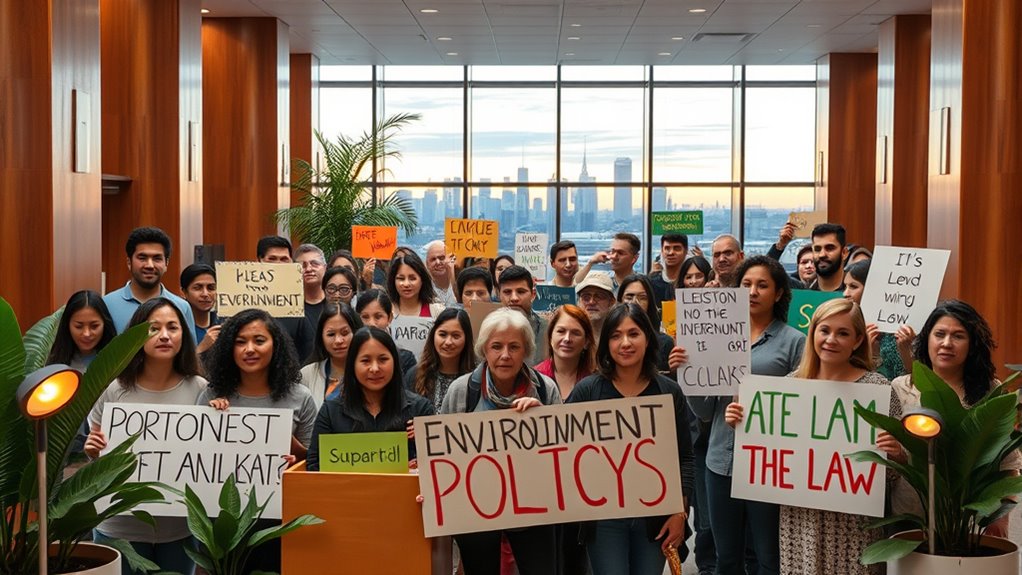You can influence lawmakers by engaging in grassroots activities like attending town hall meetings, writing letters, making calls, and organizing campaigns to raise awareness about environmental issues. Advocacy efforts such as protests, petitions, and social media campaigns help keep the public’s concerns visible. Your collective actions can encourage policies supporting renewable energy, conservation, and sustainable practices. To discover how your involvement can make a real difference, keep exploring ways to participate effectively.
Key Takeaways
- Citizens influence lawmakers through advocacy, petitions, and community campaigns that raise awareness of environmental issues.
- Attending town hall meetings and direct meetings with representatives allows personal communication of environmental concerns.
- Organized grassroots efforts and media campaigns can pressure policymakers to support conservation and renewable energy laws.
- Knowledge of environmental legislation and strategic advocacy enhance the effectiveness of lobbying activities.
- Collective citizen action can lead to increased funding, stricter regulations, and new policies promoting sustainability.

Have you ever wondered how environmental policies get shaped? It’s not just about government officials sitting in their offices; it’s about how citizens like you actively influence lawmakers through lobbying efforts. When you advocate for stronger conservation policies or promote the adoption of renewable energy, you become a crucial part of the democratic process. Your voice can sway decisions that impact the environment for generations to come. Lobbying isn’t limited to big organizations; individuals, community groups, and small nonprofits all play a role in shaping policy. By engaging in these activities, you help guarantee that environmental concerns stay on the political agenda.
You can participate in lobbying by attending town hall meetings, writing letters, making phone calls, or even meeting with your representatives. When you communicate your support for renewable energy initiatives, you’re telling lawmakers that clean energy solutions matter to you. Similarly, advocating for conservation policies—such as protecting natural habitats or reducing pollution—helps push these issues to the forefront of legislative priorities. Your engagement demonstrates that there’s public backing for sustainable policies, encouraging lawmakers to prioritize environmental issues in their agendas. The power of collective citizen action can influence laws, funding, and regulations that promote sustainable development.
Understanding how lobbying works helps you realize that your input isn’t just noise; it can be a catalyst for change. When citizens organize campaigns or rally around specific policies, they often draw media attention and generate public pressure. This, in turn, motivates lawmakers to act. For example, a well-organized campaign advocating for investments in renewable energy can lead to increased government funding or new incentives for clean energy projects. Similarly, grassroots efforts to strengthen conservation policies can result in stricter environmental protections or expanded protected areas. Your participation, whether through social media, petitions, or community events, amplifies these messages and makes a tangible difference.
Remember, effective lobbying isn’t about just voicing opinions; it’s about being informed and strategic. Stay updated on environmental issues and understand how legislation is crafted. When you know the specifics of policies related to renewable energy or conservation, your arguments become more compelling. Connecting with local organizations that lobby for the environment can amplify your impact, providing resources and guidance on how to best advocate. The more you get involved, the more you contribute to shaping laws that protect our planet. Recognizing the importance of projector technology in communication and presentation can also be a useful tool to spread awareness about environmental issues.
Ultimately, lobbying for the environment empowers you to become an active participant in democracy. Your efforts can influence lawmakers to pass policies that prioritize sustainability and environmental health. By staying engaged and persistent, you help forge a future where renewable energy powers our communities and conservation policies preserve our natural world for countless generations. Additionally, understanding environmental legislation helps you navigate the policy landscape more effectively and advocate more persuasively. Learning about regulatory compliance can further enhance your advocacy efforts by ensuring your initiatives align with legal standards and policies. Engaging with public policy processes allows you to better understand how laws are developed and amended over time, making your advocacy more impactful.
Frequently Asked Questions
How Do Environmental Lobbyists Decide Which Policies to Target?
When deciding which policies to target, you start with a thorough policy assessment, identifying issues that need urgent attention. You also engage stakeholders—scientists, community members, and businesses—to gather diverse perspectives. This process helps you prioritize policies with the greatest environmental impact and public support. By combining data and stakeholder input, you focus your efforts on effective, achievable changes that can influence lawmakers and advance environmental goals.
What Are the Most Effective Lobbying Strategies for Environmental Advocates?
Did you know that grassroots organizing can increase policy support by up to 40%? As an environmental advocate, you should focus on coalition building to strengthen your influence. Mobilize local communities, host events, and collaborate with like-minded groups. These strategies create a powerful collective voice that lawmakers can’t ignore. By actively engaging citizens and forming alliances, you make your lobbying efforts more effective and drive meaningful environmental change.
How Do Citizen-Led Campaigns Differ From Professional Lobbying Efforts?
You’ll find that citizen-led campaigns differ from professional lobbying through grassroots mobilization and citizen awareness. As a citizen, you actively engage your community, organize events, and spread awareness to influence lawmakers directly. Unlike professional lobbyists, who often work behind the scenes, your effort emphasizes collective action and local involvement, making your voice more relatable and powerful. This grassroots approach amplifies public concern, increasing pressure on policymakers to prioritize environmental issues.
What Role Do Social Media Campaigns Play in Environmental Lobbying?
Think of social media campaigns as a wildfire spreading awareness rapidly. You play a key role in digital activism, turning viral awareness into real change. When you share and amplify environmental issues, you help mobilize communities and pressure lawmakers. For example, a single post can spark thousands of shares, making environmental concerns impossible to ignore. Your online efforts transform individual voices into a powerful force for policy change.
How Does Lobbying Influence International Environmental Agreements?
You can see how lobbying influences international environmental agreements through corporate influence and diplomatic negotiations. When citizens or groups lobby, they push for policies that shape negotiations and sway lawmakers. Corporate influence can also impact the process, either supporting or opposing certain commitments. Your involvement, whether through advocacy or raising awareness, helps guarantee that international negotiations reflect public interest and environmental priorities.
Conclusion
By now, you see how your voice can truly move mountains in the fight for the environment. When you actively engage and lobby, you’re not just talking; you’re shaping policies and making a real difference. Remember, change doesn’t happen overnight, but with persistence, you can turn the tide. So, never underestimate the power of your efforts—sometimes, a little push is all it takes to make waves and bring about lasting change.









